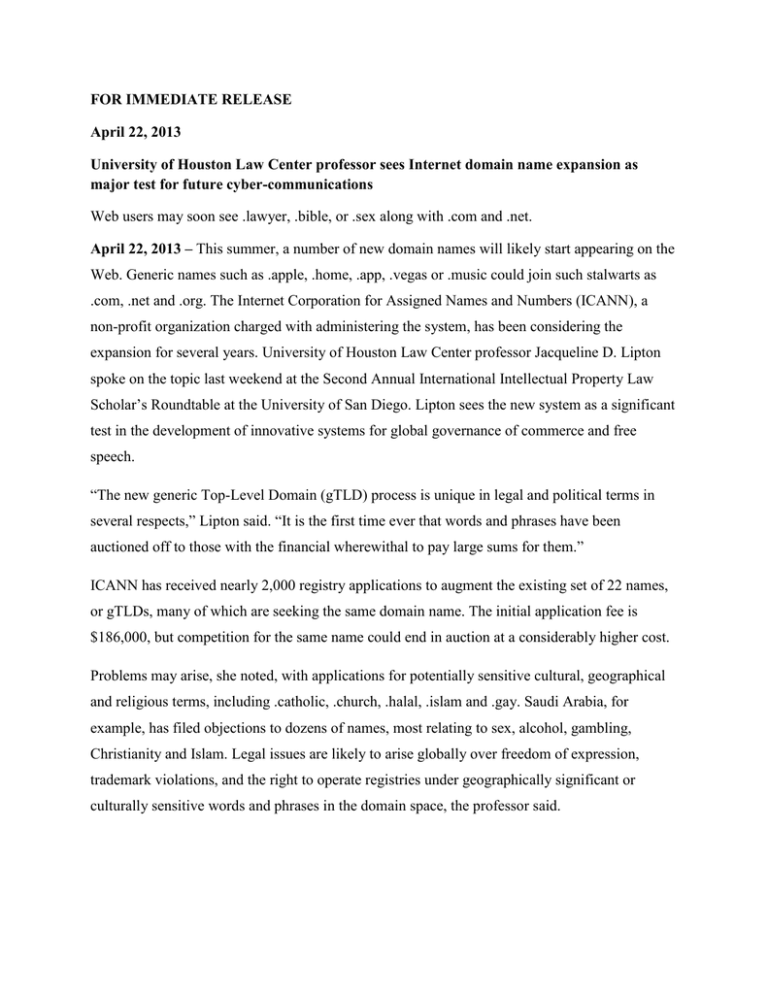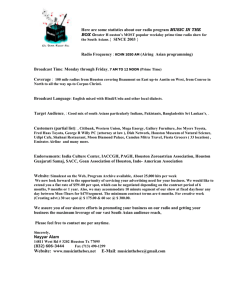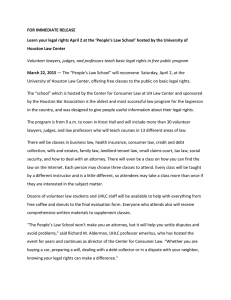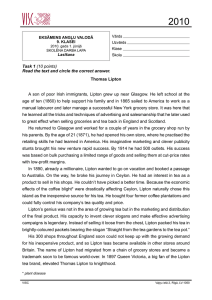FOR IMMEDIATE RELEASE April 22, 2013
advertisement

FOR IMMEDIATE RELEASE April 22, 2013 University of Houston Law Center professor sees Internet domain name expansion as major test for future cyber-communications Web users may soon see .lawyer, .bible, or .sex along with .com and .net. April 22, 2013 – This summer, a number of new domain names will likely start appearing on the Web. Generic names such as .apple, .home, .app, .vegas or .music could join such stalwarts as .com, .net and .org. The Internet Corporation for Assigned Names and Numbers (ICANN), a non-profit organization charged with administering the system, has been considering the expansion for several years. University of Houston Law Center professor Jacqueline D. Lipton spoke on the topic last weekend at the Second Annual International Intellectual Property Law Scholar’s Roundtable at the University of San Diego. Lipton sees the new system as a significant test in the development of innovative systems for global governance of commerce and free speech. “The new generic Top-Level Domain (gTLD) process is unique in legal and political terms in several respects,” Lipton said. “It is the first time ever that words and phrases have been auctioned off to those with the financial wherewithal to pay large sums for them.” ICANN has received nearly 2,000 registry applications to augment the existing set of 22 names, or gTLDs, many of which are seeking the same domain name. The initial application fee is $186,000, but competition for the same name could end in auction at a considerably higher cost. Problems may arise, she noted, with applications for potentially sensitive cultural, geographical and religious terms, including .catholic, .church, .halal, .islam and .gay. Saudi Arabia, for example, has filed objections to dozens of names, most relating to sex, alcohol, gambling, Christianity and Islam. Legal issues are likely to arise globally over freedom of expression, trademark violations, and the right to operate registries under geographically significant or culturally sensitive words and phrases in the domain space, the professor said. Policy issues also are being hotly debated. Earlier this month at an ICANN meeting in Beijing, for instance, questions were raised about whether the organization should expand its role beyond administration of names to include content oversight. “It is problematic because ICANN doesn’t really have, nor does it necessarily want, the power to regulate international law relating to intellectual property and freedom of expression, but no one else does either,” Lipton said. “It remains to be seen if more domestic laws will develop with respect to balancing free speech and cultural interests against commercial interests online.” The Baker Botts Professor of Law at the Law Center, Lipton is a recognized expert on law and digital technology. She is the author of Internet Domain Names, Trademarks and Free Speech as well as a cyberspace casebook, and numerous law review articles. She is also a frequent speaker at national and international conferences. Lipton is well-versed on developments in global communications and online business models. Her scholarship at the University of Houston Law Center focuses on law and digital technology as well as law and the creative arts. For more details on Lipton’s areas of expertise and academic background, visit her profile on UH Law Center’s site. To schedule a media interview with Professor Lipton, contact Carrie Criado, Executive Director of Communications and Marketing, 713-743-2184, cacriado@central.uh.edu; or John T. Kling, Communications Manager, 713-743-8298, jtkling@central.uh.edu. About the University of Houston The University of Houston is a Carnegie-designated Tier One public research university recognized by The Princeton Review as one of the nation's best colleges for undergraduate education. UH serves the globally competitive Houston and Gulf Coast Region by providing world-class faculty, experiential learning and strategic industry partnerships. Located in the nation's fourth-largest city, UH serves more than 40,700 students in the most ethnically and culturally diverse region in the country. About the University of Houston Law Center The University of Houston Law Center is the leading law school in the nation's fourth-largest city. Founded in 1947, it is a top-tier institution awarding Doctor of Jurisprudence (J.D.) and Master of Laws (LL.M.) degrees. The Law Center is fully accredited by the American Bar Association and is a member of the Association of American Law Schools.




